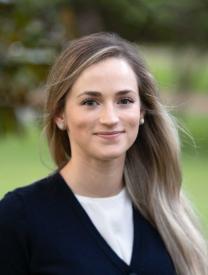Blair Sackett is a Post-doctoral Fellow at the Watson Institute for International and Public Affairs at Brown University. Her research examines inequality and how organizations shape the distribution of resources. Using qualitative methods, she has examined these organizational processes in the context of refugee resettlement to the U.S. and long-term displacement in a refugee camp in Kenya.
She is the first author of the book We Thought It Would Be Heaven: Refugees in an Unequal America (co-authored with Annette Lareau) with the University of California Press. Blair did observations with four refugee families from the Democratic Republic of the Congo resettled to Philadelphia, and five years later, conducted follow-up interviews. Based on this research and in-depth interviews with 40 additional Congolese refugee families and 35 aid workers and volunteers, We Thought It Would Be Heaven examines the organizational obstacles that resettled refugees face across an array of service agencies in the U.S. from schools to welfare offices. Across agencies, seemingly small organizational errors—missing a deadline, mistaking a rule, or misplacing a form—tangle processes and impede access to crucial resources, threatening to become barriers to upward mobility.
She is currently working on her second book project, which reveals how government polices and humanitarian organizational practices shape refugee families' economic strategies, social networks, and community organizations. She conducted over 14 months of ethnographic observation in Kakuma refugee camp, interviews with 91 refugee families and 52 aid workers, and longitudinal weekly questionnaires with refugee households. This research shows that budget cuts paired with shifting organizational logics of aid destabilized not only individual households, but also the exchange of resources between refugee ties, thus reducing social capital. Her findings highlight the importance of informal refugee organizations, like churches, women’s groups, and ethnic associations—groups that operated in the shadow of the formal humanitarian organizations. This research has been supported by the Fulbright-Hays DDRA Fellowship, the Teece Fellowship, and the Gertrude and Otto Pollak Research Fellowship, as well as Swahili language training through U.S. Department of Education Foreign Language and Area Studies Fellowships.
Blair graduated from Washington University in St. Louis with a B.A. in Urban Studies and African and African American Studies, where she wrote an honors thesis on immigrant incorporation and racial identification of Ethiopian immigrants and refugees in Washington, D.C.
Ph.D. in Sociology, University of Pennsylvania, 2022
M.A. in Sociology, University of Pennsylvania, 2015
B.A., Urban Studies and African and African American Studies, Washington University in St. Louis, 2012
Social inequality; international migration; work and organizations; economic sociology; race and ethnicity; global and transnational sociology; sociology of development; sociology of culture; sociology of the family; qualitative research methods, ethnography
IAPA 1700P - Refugee Families, Brown University
SOCI 270 – Refugee Families, Bryn Mawr
SOCI 101 - Introduction to Sociology, University of Pennsylvania
Sackett, Blair and Annette Lareau. 2023. We Thought It Would Be Heaven: Refugees in an Unequal America. University of California Press.
Sackett, Blair and Annette Lareau. 2023. “Institutional Entanglements: How Institutional Knots and Reverberating Consequences Burden Refugee Families.” RSF: The Russell Sage Journal of the Social Sciences.
Sackett, Blair. 2022. “A Uniform Front?: Power and front-line worker variation in Kakuma refugee camp, Kenya.” Ethnography.
Watson Institute for International and Public Affairs, Brown University
Institute for the Study of International Migration, Georgetown University

